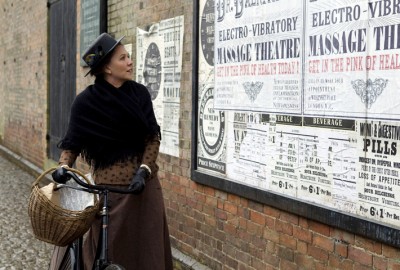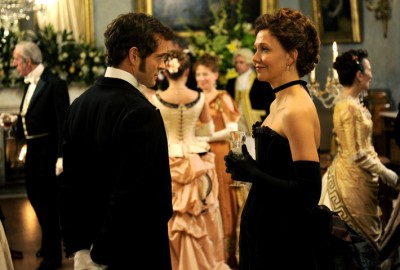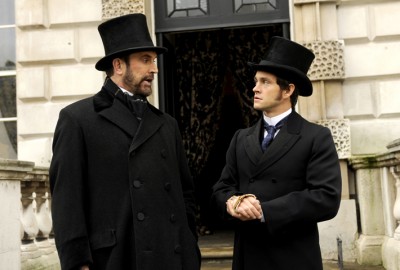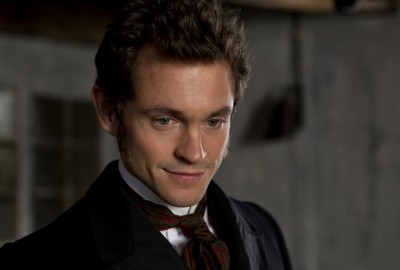| Reviews & Columns |
|
Reviews DVD TV on DVD Blu-ray 4K UHD International DVDs In Theaters Reviews by Studio Video Games Features Collector Series DVDs Easter Egg Database Interviews DVD Talk Radio Feature Articles Columns Anime Talk DVD Savant Horror DVDs The M.O.D. Squad Art House HD Talk Silent DVD
|
DVD Talk Forum |
|
|
| Resources |
|
DVD Price Search Customer Service #'s RCE Info Links |
|
Columns
|
|
|
Hysteria

Please Note: The images used here are taken from promotional stills provided by Sony Pictures Classics, not the Blu-ray edition under review.
I blame Secretary. Maggie Gyllenhaal's breakout role was in Steven Shainberg's 2002 romantic-comedy-sex-drama about the out-of-the-ordinary sexual liberation of a girl who seemed doomed to dreary repression, and that, along with her very appealing and nifty turns in Don Roos's Happy Endings and Laurie Collyer's sherrybaby, led me to believe that if Gyllenhaal would deign to star in a movie about the Victorian-era invention of the vibrator, there must be something to it. However, that movie, Tanya Wexler's Hysteria, turns out to be from the farthest-opposite end of the spectrum from the aforementioned, worthy Gyllenhaal vehicles, all of which aimed for some kind of complexity and honesty and gave her rich, deep characters to play against cinematic backdrops that, marked through with the filmmakers' acutely felt, effectively rendered subjective visions of life, bore enough emotional and logistical resemblance to human realities to give them some heft and impact. Hysteria, conversely, takes a fine star, an interesting story centered around the juicy and fascinating topic of misunderstood female sexuality, and does everything it can to turn it into an unutterably silly, trivial "romp" stamped so thoroughly into cookie-cutter shape that it barely registers.
We're introduced to Charlotte Dalrymple (Gyllenhaal), a suffragette/progressive and crusading helper of the poor in 1880s England, when she hurtles headlong into the path of a young, idealistic doctor, Mortimer Granville (Hugh Dancy, Martha Marcy May Marlene). Granville is out to establish himself in some kind of reliable position in a world whose archaic approaches to medicine have clashed with his adherence to newfangled science (washing one's hands, changing infectious bandages, etc.) and left him out of a job. Charlotte is the eldest daughter, along with her much more Victorian-feminine-ideal sister, Emily (Felicity Jones), of Dr. Robert Dalrymple (Jonathan Pryce), an eminent London physician who specializes most particularly in the treatment of "hysteria," a catch-all diagnosis that covers everything from sleeplessness to headaches to stomach cramps and seems to plague only upper-middle-class ladies, a great many of whom flock to Dr. Dalrymple for his special "treatment." This cure involves the placement of a curtain for delicacy and modesty, then a gynecologist's-table positioning of the afflicted lady and a manual, entirely professional stimulation of the genitals to relieve all of that built-up tension. Dr. Dalrymple is in desperate need of a helping hand, so to speak, and so he recruits Dr. Granville into his practice and his household (as a prospect for the chaste, phrenology-practicing Emily). The younger man turns out to be a most welcome and popular addition to Dr. Dalrymple's "paroxysm"-inducing clinic, so much so that the schedule is overbooked daily and his poor hand, no matter how many times he soaks it in ice, is cramped, aching, and in need of a splint.

Meanwhile, Dr. Granville's longtime pal and gay, aristocratic, wannabe benefactor and eccentric inventor of electrical gadgets, Edmund St. John-Smythe (Rupert Everett, natch), has been tinkering with a sort of motorized feather-duster. When Dr. Granville's aching hand is in need of some massaging relief, he spontaneously applies this contraption to it, and a light bulb goes off in his head: maybe all that injurious manual labor could be saved with the modification of St. John-Smythe's feather duster to serve the same purpose to which his poor, overworked digits have been put so mercilessly! At the same time, the free-spirited, good-hearted, militant-bluestocking Charlotte disrupts the equilibrium of the Dalrymple household with her crazy ideas about women's equality, redressing economic injustice through her settlement house for poor women and children (the Dalrymples' unlikely maid, a flirtatious former prostitute played by Ashley Jensen, was one of her rescues), and her constant need for donations from her wealthy, snobbish, increasingly reluctant and embarrassed father. Also disturbed by Charlotte's insouciance is the betrothal of convenience between Granville and Emily; Charlotte becomes an alluring distraction after Granville begins to find himself fascinated with this annoying sister -- her wholehearted commitment, the causes and projects his idealistic side finds admirable in spite of his newly careerist self, and her refreshingly relaxed, pragmatic, sexually aware nature and physical being. Granville eventually comes around to the difficult but wonderful woman obviously meant for him, and none too soon, because it is he who must save her from a truly grave accusation of "hysteria," with consequent consignment to a sanitarium and forced hysterectomy, when the patriarchal authorities decide to take a minor infraction -- Charlotte's smacking a snidely aggressive policeman -- as an opportunity to shut her and her troublesome good works down for good.
Everything in Hysteria is plotted so by-the-numbers, and played out scene for scene in a way so timidly conventional, that it's like watching a half-deflated balloon just bobbing obligatorily along in one direction, but with no particular reason or place to go. Wexler reveals the most likely source of the problem in the supplements, where she speaks of aspiring to combine a Merchant-Ivory, period-film sensibility with the contemporary, fluffy-English cuteness of Four Weddings and a Funeral. "Merchant Ivory" (filmmakers too often very unfairly dismissed as cinematic antique peddlers) here has the most obvious, reductive meaning: a minute, impressive-enough but fairly sterile attention to period detail for a faithful reproduction of the wallpaper, trinkets, and carpeting of the era. But the Four Weddings and a Funeral-ness renders all that completely pointless: Dancy, whether of his own volition or at Wexler's behest, embodies a hemming-and-hawing, smirking-and-mugging Hugh Grant stereotype par excellence, and the picture's primary mode is one of the smarm exemplified by Grant when he's doing his inexplicably popular Englishman-parody schtick. The film has the personality of someone who laughs at their own tired jokes, and so we get hamming in both the shot and countershot in the scenes that, with a prudish, awkward giggle, depict the unknowingly orgasmic "treatments" (those poor actresses, having to play climaxes as slapstick in a movie that then has the gall to pat itself on the back, via bad, sub-Norma Rae speeches and grandstanding, for its "feminist" enlightenment!). The pushy dullness continues through the recurrent, shockingly trite montages that have the rhythm and look of one of those trying-on-hats-to-music sequences that, The Weather Man notwithstanding, seemed destined to finally go out after the great, observantly satirical "Montage!" sequence in Team America. That placidity extends to the most basic visuals of the thing: it has a top-notch cinematographer, Sean Bobbitt (Wonderland, Hunger), but the conventional framing/composition, and the bland, slick-gray, CGI-like coolness of the tone and texture of the images (which evidently underwent some special, flattening digitizing process), along with their quasi-desaturated coloring, create a depressing visual scheme that's almost oppressively blah. Add to that Gast Waltzing's obnoxious, taunting, forced-whimsy score, and you have a mindless, ingratiating quality tainting every dimension of every scene, shackling the film to a leadenness that never lets it leave the ground.

That takes us back to Gyllenhaal for salvation. Her charm, charisma, and considerable talent do somehow manage to find their way through some of the accidental air holes Wexler forgot to seal off with her superimposed, torpid "fun," and the actress's skill and expressiveness almost make it possible to swallow even some of the more embarrassingly on-the-nose speechifying she's called upon to do. But there's no escaping, moment by moment as Hysteria unfolds before our eyes in all its willful lackluster, how desultory at best (and insulting at worst) it is; the brutal, violent misery of the sexual repression and poverty the film uses as dull-joke fodder and/or gloopy "inspiration" is never so much as hinted at (which also renders the big, suspenseful courtroom finale insignificant, without any real jeopardy). There would actually have been no problem if the film had actually been irreverent toward all of these serious-in-reality themes; that would have been infinitely preferable, if Wexler and writers Stephen and Jonah Lisa Dyer had been able to get up enough nerve for real irreverence. But the lack of real sauciness where we're being primed to expect it gets to the heart of the problem: As its smug tone shows, Hysteria is self-deluded to the point of thinking it's quite irreverent and progressive, when in fact it's punctiliously middlebrow, unimaginative, and uninspired, and the only thing worse than something fatally flawed and lacking in interest is something so described that's also cheerily convinced of its own (nonexistent) humor, charm, and provocativeness. Gyllenhaal's talent is undeniable, and her work is a pleasure to watch even in this extremely meager circumstance, but one hopes she won't lower herself to too many interesting-sounding projects that, full of potential and right-on intentions as they might seem, fail fairly thoroughly to deliver.

THE BLU-RAY DISC:
The Blu-ray gives us of the film, in a 2.35:1 widescreen aspect ratio, AVC/MPEG4-1080p transfer, does fine by the look of the film, but that's not saying too awfully much. Hysteria appears to have undergone some up-to-the-minute technical procedure to digitize its presentation even in theaters, so that something in the negative-development process itself has actually removed texture from cinematographer Sean Bobbitt's images for a gloopy yet faded-out, greyish look one associates more readily with big, CGI-saturated movies than fluffy romantic comedies. (This is according to some IMDB research; otherwise, I would have assumed a way excessive overuse of digital noise reduction.) It is, however, the intentional look of the film, not the quality of the transfer, that's questionable; visual fidelity has by all indications been maintained.
Sound:The DTS-HD Master Audio 5.1 surround soundtrack gives you all the fullness, depth, clarity, and resonance of sound you could ask for from a movie that actually does have its fair share of sonic layering fit for filling a room. You may question the sonic-aesthetic choices made in the film itself (much of the aforementioned loudness comes from Gast Waltzing's score, which gradually journeys from tedious convention to teeth-gnashing merry-go-round territory), but the way that sound emerges from your speakers is very well-done and faithful, with no imbalance, distortion, or other audio flaws to be heard at any moment.
Extras:--A full-length feature audio commentary with director Tanya Wexler is, as is often the case with films like Hysteria that fall short of their ambitions, more enjoyable than the film itself. Wexler is bright and casual, drawing from her sheaths of memories about the very long (seven-year) preparation of the film and the shoot, which was eight times more elaborate and expensive than anything she'd done prior. Aspiring filmmakers could at least learn, if not how best to choose and approach historical material like Hysteria's, a great number of valuable technical tricks and tips from Wexler and her detailed recounting of, say, shooting a character from a very low angle (necessitating a ceiling in the studio) or keeping shots to an average of four takes (let the actors get it perfect by the third time, then let them improvise on the fourth).
--"An Evening with Tanya Wexler, Hugh Dancy, and Jonathan Pryce," 12 minutes excerpted from a post-screening Q&A after a TriBeCa Film Festival screening of the film, with the director and two stars responding to queries submitted by audience members.
--"Hysteria: Behind the Scenes," a very standard six-minute promotional featurette with clips of the film intercut with sound bites from actor, director, and producer interviews.
--An abridged (45-minute) version of Emiko Omori and Wendy Slick's 2007 documentary Passion and Power: The Technology of Orgasm, which takes a less trivializing (though still sort of wink-wink, somewhat middlebrow) approach to the history of female sexual pleasure and social misunderstanding and/or condemnation of it. The tee-hee tone can still irk, but it's packed with interesting history and facts that make it more enjoyable than the smirking, pussyfooting Hysteria itself.
--About three minutes of deleted scenes.
--The theatrical trailer along with a handful of other previews for Sony Classics releases.
--By registering a vibrator-like "buzz" whenever you press enter, the menu gives you a warning about the sort of thing you're in for when watching the film.

Neither as hysterical nor as historical as it presents itself, Hysteria, Tanya Wexler's movie about a man (Hugh Dancy) who introduces the vibrator to Victorian England and the maddening, alluring, progressivist suffragette he falls in love with (Maggie Gyllenhaal), is nothing more than deeply silly in a way that's more wearying than lively. The film creates an amalgam of the true-story people and events around the introduction of the classically fun 'n reliable feminine sex aid into Victorian-era England, and tries to transplant an anodyne Four Weddings and a Funeral sensibility to that sexually repressed time and place for a result that goes from annoying to borderline awful. Comedy is the most unforgivingly subjective thing there is, but I didn't laugh once during Hysteria; it's Bob Saget-level harmlessness to a T, and to experience it is to witness, moment by painful moment, the flailing of a story, an aesthetic, and a tone that have been worked and re-worked to hew just exactly as close to the middle of the road as conceivably possible. Some performances are a bright spot that alleviate the insistent tedium of the film (Dancy, to my eyes, is just doing a Hugh Grant routine, but Gyllenhaal sparkles, as does Jonathan Pryce as the paternalistic upper-middle-class doctor who specializes in treating "hysterical" women), but the self-impressed, much too mild-mannered "naughtiness" of the film and its by-the-numbers message-movie speechifying lack any potency whatsoever. This is a movie whose convictions are all, to my mind, 100% agreeable: female sexual liberation, equality, criticism of default gender roles, social and economic justice for the poor, etc., etc. But when you actually embrace the convictions and take them seriously, it's all the more niggling and irksome when the courage of them is almost completely lacking. If only for Gyllenhaal, Rent It, but this is something I can't imagine even someone with a much higher tolerance than I for blanded-out, giggly "sex comedy" ever wanting to watch more than once.
|
| Popular Reviews |
| Sponsored Links |
|
|
| Sponsored Links |
|
|
| Release List | Reviews | Shop | Newsletter | Forum | DVD Giveaways | Blu-Ray | Advertise |
|
Copyright 2024 DVDTalk.com All Rights Reserved. Legal Info, Privacy Policy, Terms of Use,
Manage Preferences,
Your Privacy Choices | |||||||














